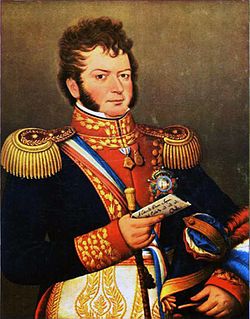| Organiser(s) | |
|---|---|
| Founded | 1955 |
| Abolished | 1966 |
| Region | Brazil Chile |
| Teams | 2 |
| Related competitions | Roca Cup Copa Río Branco Taça Oswaldo Cruz |
| Last champions | (1966) shared |
| Most championships | (4 titles) |
Copa Bernardo O'Higgins (English: Bernardo O'Higgins Cup) was a national football tournament disputed between Brazil and Chile, from 1955 to 1966. The competition, played on a two-legged format, was similar to other tournaments played at the time, such as the Roca Cup between Argentina and Brazil. [1]
Contents
The cup's name was a tribute to Bernardo O'Higgins, a figure of great importance in Chile's independence, [2] [3] and considered one of the liberators of South America during the Spanish occupation in the colonial period. [4]
